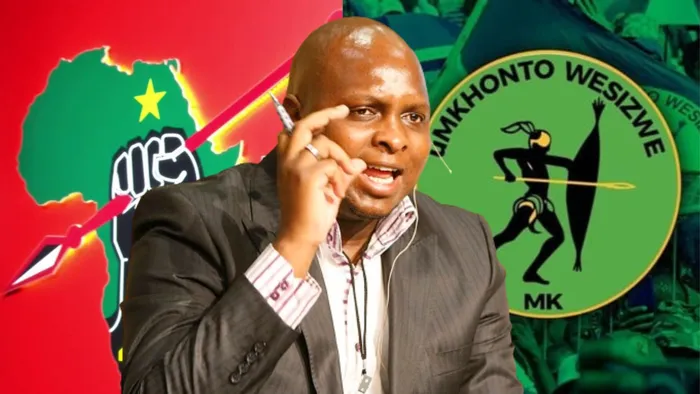Shivambu’s defection shakes opposition and alters SA political landscape

Being one of the founding members of the EFF and a major player in its leadership, Floyd Shivambu’s departure can cause major changes in the internal dynamics and approach of the party going forward. l GRAPHIC: SIZWE DLAMINI
The impact of EFF’s erstwhile deputy president Floyd Shivambu’s departure from the red berets cannot be understated. The public response of Julius Malema, contrasting Shivambu’s departure with a family member's death, emphasises the degree of loss.
Being one of the founding members of the EFF and a major player in its leadership, Shivambu’s departure can cause major changes in the internal dynamics and approach of the party going forward.
Whether this resignation may undermine the EFF or cause a review of its approach to internal cohesion and leadership, analysts disagree. Although some say the EFF would find it difficult to keep up its present pace, others contend the party’s strong ideological roots and Malema’s leadership will enable it to negotiate this era of uncertainty.
Conversely, Shivambu's choice to join the MK Party is also seen as a calculated affiliation with a political movement that might change the resistance scene in South Africa. Linked with former President Jacob Zuma, the MK Party gives Shivambu a stage to exercise influence and maybe be instrumental in the party’s expansion and consolidation.
Given Shivambu’s alliance with the MK Party, political analyst Professor Susan Booysen argues that this could help the more general left-wing movements in South Africa, especially as the party aims to create a unique identity in contrast to both the ANC in power and the EFF.
Using his knowledge and contacts to increase the party’s visibility, particularly in Parliament, Unisa’s political science lecturer, Professor Dirk Kotzé, also expects Shivambu to rapidly rise among the most well-known MK Party officials.
Shivambu’s defection has also spurred conjecture over possible future alliances or perhaps a merger between the EFF and the MK Party. Analysts contend that despite the seeming ideological differences between the two parties, Shivambu’s action might open the path for more cooperation, particularly as both parties negotiate the changing political terrain ahead of the 2024 general elections.
Any such coalition would need to bridge major ideological and strategic gaps, nevertheless, if it were to come about. If a merger or partnership is sought, the MK Party’s links to Zuma and its attitude on matters like relations with China and Russia stand in contrast to the EFF’s more pro-Western positions, therefore perhaps causing difficulties.
The MK Party does, however, have difficulties of its own, including claims of internal turmoil and cronyism that might sour public opinion. The success of the party will depend much on Shivambu’s capacity to negotiate these obstacles and support its strategic orientation.
Many have seen Floyd Shivambu's leaving the EFF as a reaction to internal strife, especially in relation to his relationship with EFF leader Julius Malema. Analysts speculate that Shivambu’s resignation sprang from dissatisfaction about his alleged marginalisation inside the party, which gave him a major forum as the deputy president.
Political expert Professor Andre Duvenhage says Shivambu’s action could also be seen as an attempt to find political cover among continuous corruption claims over the VBS affair. By affiliating with the MK Party, Shivambu may be putting himself in a political context judged to be more favourable or less hostile depending on his legal problems.
From the EFF to the MK Party, Shivambo’s change is a notable event with broad ramifications for South African politics. Analyses point out that this action represents more general political realignments and might thus change the dynamics of opposition politics in the nation.
It remains to be seen whether this movement results in fresh partnerships, changes in voter opinion, or a stronger left-wing bloc developing. But Shivambu’s choice surely represents a turning point in his political life and gives South Africa’s changing political scene still another degree of complexity.
EFF member describes Shivambu as party’s ‘brains’
Why Shivambu jumped ship for Zuma’s party
MKP breaks EFF’s back
Julius Malema vows loyalty to the EFF till the end amid Floyd Shivambu’s exit
Shivambu’s resignation equals my mother’s death – Malema
‘Floyd is the only engine that kept the small dignity on the EFF’ – South Africans react to Shivambu’s big EFF exit